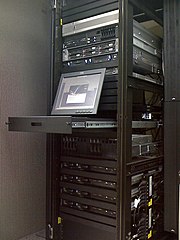 By default, the standard LAMP (Linux Apache Mysql Php/Perl/Python) stack doesn’t come particularly well optimised for handling more than a trivial amount of load. For most people this isn’t a problem, either they’re running on a large enough server or their traffic is at a level that they never hit against the limits.
By default, the standard LAMP (Linux Apache Mysql Php/Perl/Python) stack doesn’t come particularly well optimised for handling more than a trivial amount of load. For most people this isn’t a problem, either they’re running on a large enough server or their traffic is at a level that they never hit against the limits.
Anyway, I’ve hit against these limits on a number of occasions now, and while there are many good articles out there on the subject, I thought I’d write down my notes. For my own sake as much as anything else…
Apache
Apache’s default configuration on most Linux distributions is not the most helpful, and you’re goal here is to do everything possible to avoid the server having to hit the swap and start thrashing.
Caching
- Squid – Squid Reverse Proxy sits on your server and caches requests, turning expensive dynamic pages into simple static ones, meaning that at periods of high load, requests never need to touch apache. Configuration seems complex at first, but all that is really required is to run apache on a different port (say 8080), run squid on port 80 and configure apache as a caching peer, e.g.
http_port 80 accel defaultsite=www.mysite.com vhost
cache_peer 127.0.0.1 parent 81 0 no-query originserver login=PASS name=myAccel
One gotcha I found is that you have to name domains you’ll accept proxying for, otherwise you’ll get a bunch of Access Denied errors, meaning that in a vhost environment with multiple domains this can be a bit fiddly.
A workaround is to specify an ACL with the toplevel domains specified, e.g.
acl our_sites dstdomain .uk .com .net .org
http_access allow our_sites
cache_peer_access myAccel allow our_sites
- PHP code cache – Opcode caching can boost performance by caching compiled PHP. There are a number out there, but I use xcache, purely because it was easily apt-gettable.
PHP
It goes without saying that you’d probably want to make your website code as optimal as possible, but don’t spend too much energy over this – there are lower hanging fruit, and as a rule of thumb memory and CPU is cheap when compared to developer resources.
That said, PHP is full of happy little gotchas, so…
Non-exclusive list, hope it helps!
 HTML Mails is an Elgg plugin that lets notification emails be sent using HTML email templates.
HTML Mails is an Elgg plugin that lets notification emails be sent using HTML email templates.
 Recently,
Recently,  By default, the standard LAMP (Linux Apache Mysql Php/Perl/Python) stack doesn’t come particularly well optimised for handling more than a trivial amount of load. For most people this isn’t a problem, either they’re running on a large enough server or their traffic is at a level that they never hit against the limits.
By default, the standard LAMP (Linux Apache Mysql Php/Perl/Python) stack doesn’t come particularly well optimised for handling more than a trivial amount of load. For most people this isn’t a problem, either they’re running on a large enough server or their traffic is at a level that they never hit against the limits.